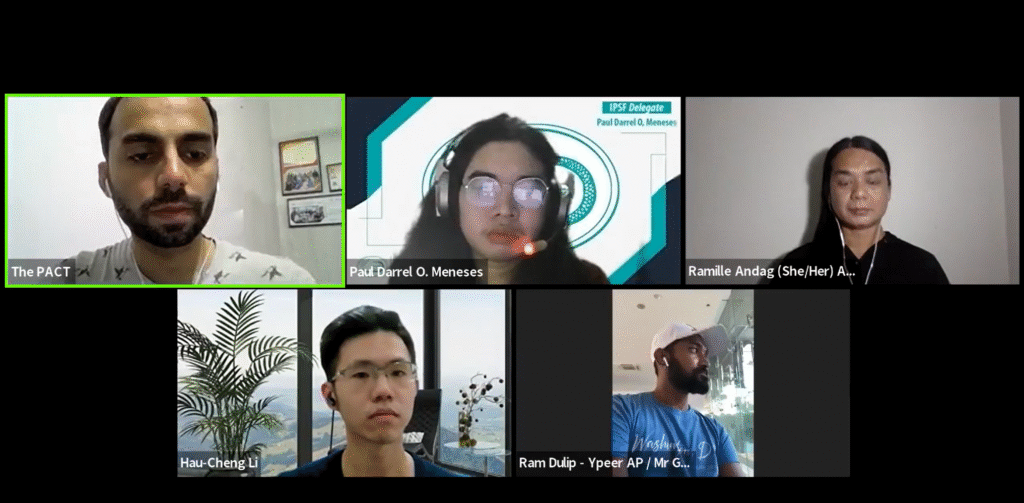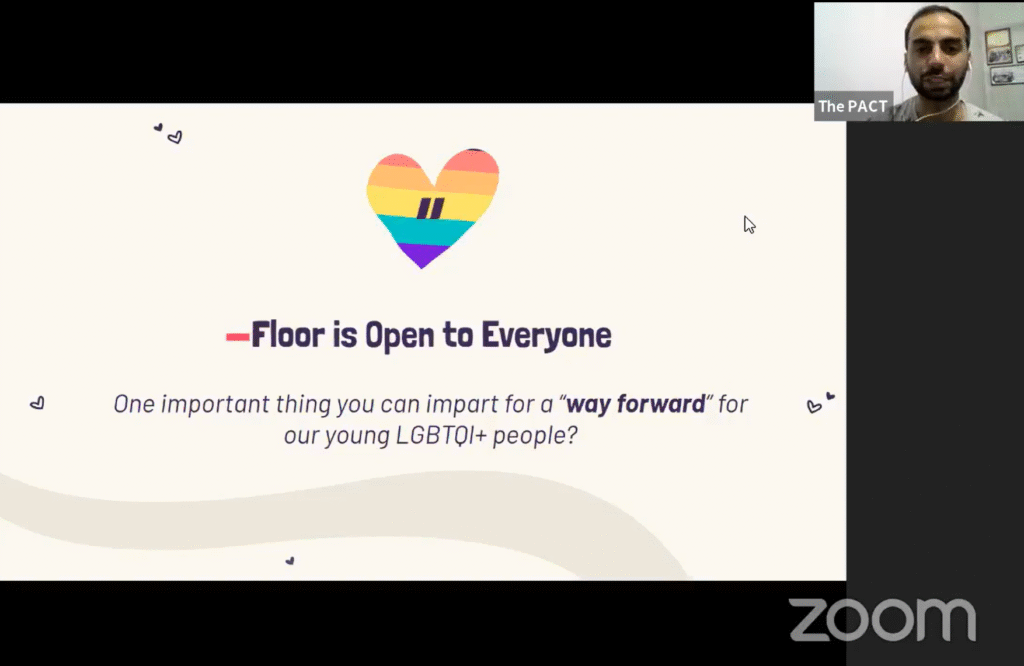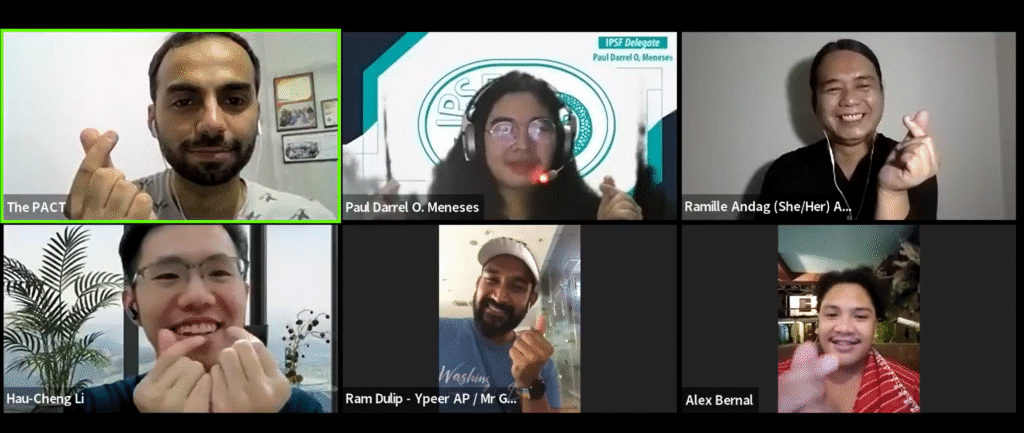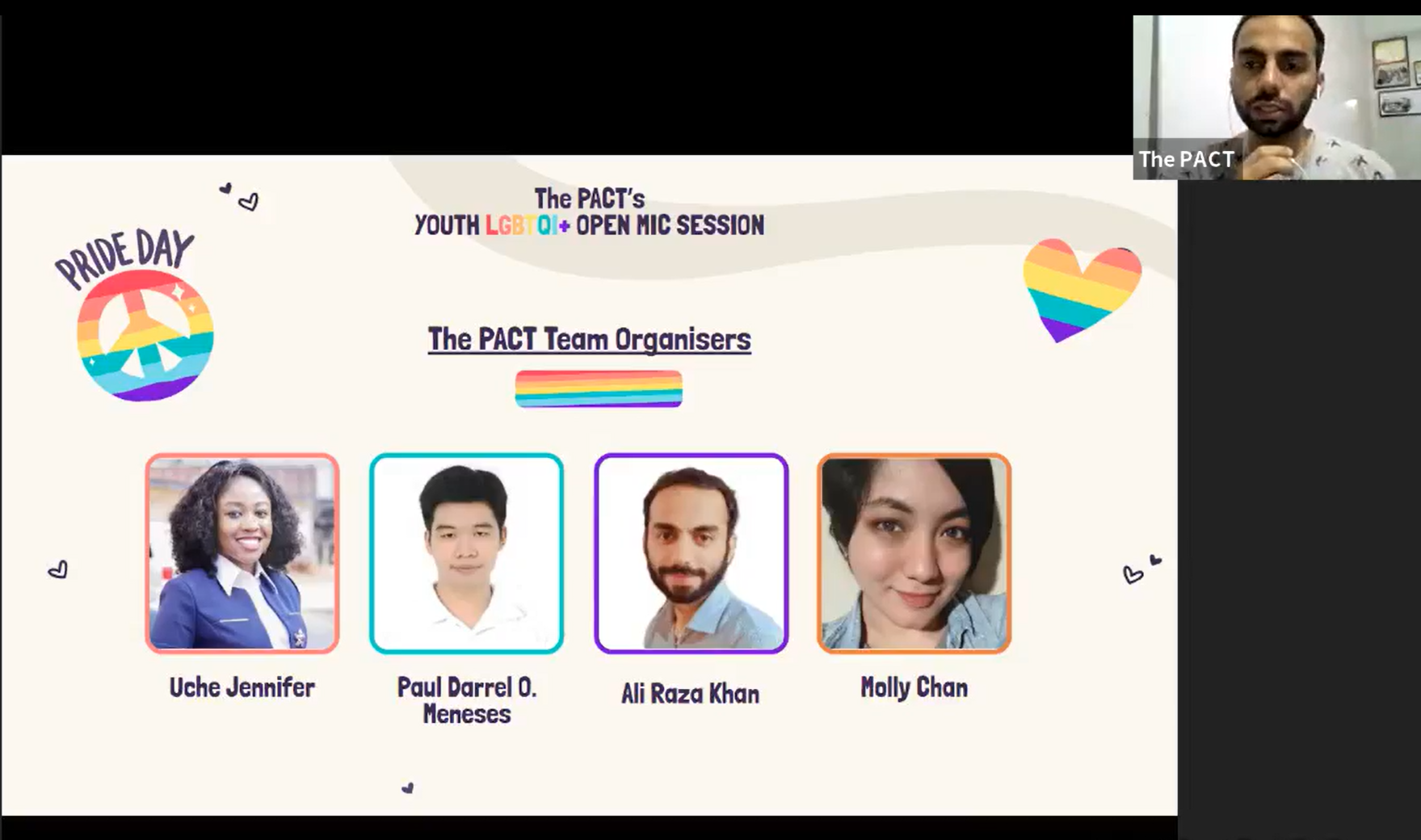On June 18th, 2022, TheYouthPACT.org hosted an impactful “Youth LGBTQI+ Open Mic Session” titled “Pride in the Post-Pandemic World.” As a volunteer coordinator for the advocacy working group at TheYouthPACT.org, I, Ali Raza Khan from Pakistan, had the privilege of co-hosting this session alongside Paul Darrel Omenesis from the Philippines.
The session commenced with an introduction to PACT, a vibrant coalition of 152 youth organizations dedicated to collaboratively and strategically addressing global HIV responses and ensuring the health, well-being, and human rights of all young people since 2013. Paul also outlined general guidelines for Zoom conversations to ensure a respectful and attentive environment. Following this, members of the organizing team, including myself, Jennifer Ball, and Moli Chen, were introduced.
The core of the open mic session featured a diverse panel of speakers from prominent organizations working on LGBTQI+ issues across Asia and Africa. We heard from Ramil Andag of APCOM, Li Hao Cheng of PSA-Taiwan, Alexander Bernard of Youth for Youth Organization, Justin Chidozie from CHEVS, and Ram Dulip from YPEER Asia Pacific Network.

My involvement in this session as an openly HIV-positive gay activist from Pakistan highlights my long-standing commitment to LGBTQI+ rights, not just within my country but globally. This event served as another example of my open work advocating for gay rights.
The speakers shared invaluable insights into the challenges and advancements for the LGBTQI+ community in the post-pandemic world. Ramil Andag from APCOM discussed how COVID-19 exacerbated existing human rights challenges for LGBTQI+ communities, particularly those in the informal sector, leading to difficulties in accessing work, livelihoods, and even social protection programs. APCOM responded by advocating for LGBTQI+ inclusive COVID responses from organizations like the World Health Organization and supporting local organizations in migrating to digital advocacy spaces.
Li Hao Cheng of PSA-Taiwan shared a more fortunate perspective, noting Taiwan’s progressive stance, including the legalization of same-sex marriage in 2019. However, he acknowledged that the pandemic did freeze some advocacy efforts due to the inability to hold physical pride events and a decrease in routine health check-ups for STDs. PSA-Taiwan adapted by organizing online events and promoting home delivery HIV tests.

Justin Chidozie from CHEVS provided a stark reality of the situation in Nigeria, where discriminatory laws like the Same-Sex Marriage Prohibition Act of 2014 lead to severe consequences for LGBTQI+ individuals, including up to 14 years imprisonment for same-sex public displays. Despite this, CHEVS is actively working to empower young LGBTQI+ people by building their collective power and redefining empowerment. A notable initiative is their “Tech for Pride” project, aiming to onboard LGBTQI+ individuals into the tech ecosystem, providing skills in web development, data analysis, and product design, enabling them to work remotely and overcome employment discrimination. CHEVS also launched a mental health program during the pandemic to address the increased instances of mental health challenges and homelessness among LGBTQI+ individuals.
Ram Dulip from YPEER Asia Pacific Network shared a unique perspective from Sri Lanka. While acknowledging the challenges posed by the country’s economic crisis, Ram highlighted how the pandemic, paradoxically, led to increased visibility and acceptance for the LGBTQI+ community through social media engagement. However, the transgender community has faced significant challenges due to the inability to access hormone treatments amidst the crisis.
Alexander Bernard of Youth for Youth Organization in the Philippines highlighted the lack of SRHR service delivery for LGBTQI+ youth during the pandemic, particularly for those cast out by their families. His organization provided essential aid and shifted to digital platforms for information dissemination and capacity building, finding it effective in reaching young people who previously couldn’t attend physical events.
The session concluded with powerful imparting messages for young LGBTQI+ individuals. Ramil Andag emphasized the importance of continuing to take space, demanding meaningful participation, and asserting basic human rights, not special rights. Ram Dulip encouraged the community to move beyond seeking sympathy and instead demonstrate their capabilities and contributions to society. Alexander Bernard’s powerful motto, “Nothing about us without us,” resonated, urging the community to claim their rightful space and be heard. Justin Chidozie stressed the importance of meaningful engagement coupled with responsibility, encouraging self-empowerment and acquiring technical expertise to engage with systems and governments effectively. Finally, Li Hao Cheng’s message to “be like water” encouraged mindfulness, treating others with love, and broadening horizons to foster a more heartwarming and loving community.

This open mic session truly showcased the resilience, innovation, and unwavering spirit of the youth LGBTQI+ community and their allies in navigating the complexities of a post-pandemic world. It was a testament to the ongoing fight for equality and inclusion, demonstrating that even in challenging times, the voices of advocacy and hope continue to rise.
Watch the complete video on TheYouthPACT.org facebook page here: https://www.facebook.com/theyouthpact/videos/563724965374023


Leave a Reply
You must be logged in to post a comment.